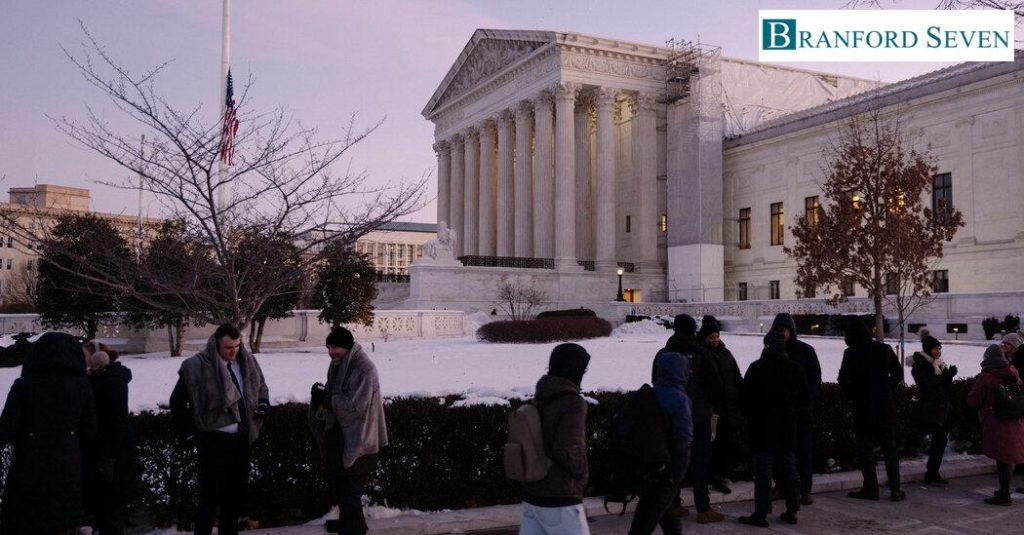In a pivotal moment in the world of social media, the Supreme Court is currently examining arguments surrounding a law that could potentially place TikTok in jeopardy in the United States. Driven by national security worries connected to the app’s Chinese ownership, this law could lead to a complete ban on the popular social media platform if its parent company, ByteDance, doesn’t sell it before January 19, 2024.
Understanding the TikTok Situation
The discussions in the Supreme Court have sparked significant interest and concern across the nation. Lawmakers believe that because TikTok is owned by a Chinese company, there are risks associated with how user data is managed and shared. This situation raises questions about the app’s influence, especially among younger users who make up a huge part of TikTok’s audience.
A Law Born from Worry
Congress passed the law with the aim of protecting American users from potential data mishandling by foreign governments. During the Supreme Court session, justices from various political backgrounds voiced their skepticism regarding TikTok’s arguments against the law. Some conservative justices pointed out the real risks of the Chinese government having access to users’ personal information, while some liberal justices debated whether there could be better solutions that don’t affect free speech so drastically.
The Debate Over Free Speech
TikTok’s lawyers argue that the law infringes on the First Amendment rights, which protect free expression. They claim that forcing TikTok to sell or face a ban is not only harmful to its business but also a blow to the freedoms users enjoy when they create and share content on the platform. Meanwhile, the Biden administration stands firm in defense of the law, stressing that the concerns for national security must take precedence.
Potential Outcomes and Concerns
This legal battle could radically change TikTok’s landscape in the U.S. If the Supreme Court rules against TikTok, it might pave the way for the app to be banned entirely, which could lead to a significant shift in how millions of users interact online. There’s a lot of speculation about the negative impacts on businesses that have thrived using TikTok for advertising and marketing. In fact, TikTok’s own data suggests that a ban could cost U.S. businesses around $1.3 billion in just a month, a startling figure for many small companies that rely heavily on this platform.
Expressions of Doubt About the Ban
Several justices hinted that there might be less restrictive alternatives to a full ban on TikTok. This raises hope among supporters of the platform who worry about the consequences of losing such a valuable communication tool. The court’s decisions reflect ongoing concerns between safeguarding citizens and preserving the freedoms that allow for self-expression.
What Happens Next?
As the court weighs its decision, many are left wondering what the future holds for TikTok. The platform has already faced criticism and scrutiny, but supporters argue that banning it outright may do more harm than good. With TikTok’s popularity showing no signs of dwindling, many users are speaking out, hoping that their voices are heard.
- The Supreme Court’s decision could redefine user engagements on social media platforms.
- Concerns about national security are fraying the connection between users and their favorite apps.
- This legal showdown could inspire other countries to evaluate their social media policies.
Billionaire Proposals to Save TikTok
Amid these events, there are discussions surrounding a bid to purchase TikTok’s U.S. assets. A group led by billionaire Frank McCourt and investor Kevin O’Leary has made headlines with an offer to buy TikTok’s operations, excluding its crucial algorithm. Dubbed ‘The People’s Bid for TikTok’, this proposal aims to secure the app’s future while sidestepping some of the potential pitfalls of its Chinese ownership.
Looking Ahead
The Supreme Court’s ruling is expected shortly, and depending on its outcome, it could either keep TikTok thriving in the states or pose a significant threat to its existence. Observers and users alike are left on the edge of their seats, waiting to see if their social media habits will need a major reset. With so much at stake, it’s clear that what happens next will have ripple effects on everything from political engagement to potential new social media trends.



